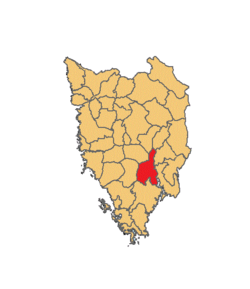| Barban Barbana, Barbon | |
|---|---|
| Municipality | |
| Barban Municipality Općina Barban | |
 Flag Flag | |
 Location of Barban municipality in Istria Location of Barban municipality in Istria | |
 | |
| Coordinates: 45°06′N 14°01′E / 45.100°N 14.017°E / 45.100; 14.017 | |
| Country | |
| County | |
| Government | |
| • Municipal mayor | Dalibor Paus |
| Area | |
| • Municipality | 90.5 km (34.9 sq mi) |
| • Urban | 4.0 km (1.5 sq mi) |
| Elevation | 229 m (751 ft) |
| Population | |
| • Municipality | 2,491 |
| • Density | 28/km (71/sq mi) |
| • Urban | 218 |
| • Urban density | 55/km (140/sq mi) |
| Time zone | UTC+1 (CET) |
| • Summer (DST) | UTC+2 (CEST) |
| Postal code | 52207 |
| Area code | 52 |
| Website | barban |
Barban (Italian: Barbana, Čakavian Barbon, or Brban) is a small town and municipality in the southern part of eastern Istria, Croatia.
The municipality of Barban covers an area of around 100 km and contains 72 villages with a total of 2,491 people.
History
The site of a Bronze Age prehistoric hill fort, human remains have been found on the site that dates back approximately 3,400-4,000 years back. The name Barban appears for the first time in an ecclesiastic document dated 740 A.D. In the Middle Ages, the town was fortified while under control of feudal lords from Pazin, and parts of those medieval fortifications can still be seen. In the second half of the 13th century, having been depopulated by the plague in 1312, a small colony of Dalmatians from Finodol settled in the area, brought by the counts of Gorizia.
In 1374, upon the death of Albert IV, Count of Pazin, it became a full Habsburg possession, before being taken over by the Republic of Venice in the 16th century. The Loredan noble family bought Barban from the counts in Pazin in 1535.
In the main square, which is reached by passing through Velika Vrata (the Great Gate, 1718), stands the St. Nicholas parish church with baroque altars and paintings by Venetian masters from the 16th-18th centuries, a Late Gothic stone tabernacle, and wooden baroque sculptures.
Demographics
According to the 2021 census, its population was 2,491, with 218 living in the town proper. The village of Sutivanac is the largest in the municipality. It had 2,721 people in 2011, 75% of whom were Croats. The town of Barban itself had a population of 221.
Prstenac tournament

An equestrian tournament, known as Trka na prstenac and very similar to Sinjska alka, is held in Barban on the third Sunday in August. It is a medieval jousting game that goes back to 1696 in Barban, but it is much older in origins and is otherwise celebrated in various forms in several medieval towns in Italy today. This tradition draws tourists and spectators in great numbers in a lively and popular celebration.
References
- Register of spatial units of the State Geodetic Administration of the Republic of Croatia. Wikidata Q119585703.
- ^ "Population by Age and Sex, by Settlements" (xlsx). Census of Population, Households and Dwellings in 2021. Zagreb: Croatian Bureau of Statistics. 2022.
- "ISTRA.HR". www.istra.hr (in Croatian). Retrieved 2023-04-26.
- "Population by Ethnicity, by Towns/Municipalities, 2011 Census: County of Istria". Census of Population, Households and Dwellings 2011. Zagreb: Croatian Bureau of Statistics. December 2012.
Sources
| This article includes a list of references, related reading, or external links, but its sources remain unclear because it lacks inline citations. Please help improve this article by introducing more precise citations. (September 2011) (Learn how and when to remove this message) |
- Trka na prstenac (in Croatian)
External links
- Official website (in Croatian)
- Town of Barban at Istrianet.org
| Settlements of Barban | |
|---|---|
| Subdivisions of Istria County | ||
|---|---|---|
| Cities and towns |  | |
| Municipalities | ||